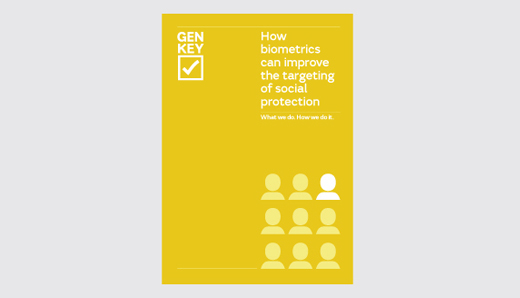In developing countries, social protection programs are vital for helping people escape poverty. However, lack of official identification and weaknesses in traditional record-keeping systems often mean that these programs fail to reach the very people they were designed to protect. Biometric technology is addressing these problems, helping some of the world’s poorest and most vulnerable people find a foothold in society.
In 1995, the UN defined extreme poverty as “a condition characterized by severe deprivation of basic human needs, including food, safe drinking water, sanitation facilities, health, shelter, education and information”. It’s a condition that depends not only on low income, but also a lack of access to the basic services and resources human beings need to live. It’s estimated that more than 800 million people around the world live in extreme poverty.
In December 2015, the UN launched 17 sustainable development goals to guide development actions over the next 15 years. Of these, the number 1 goal is to end poverty in all its forms, everywhere, by 2030.
Social protection is one of the key ways governments around the world are seeking to achieve this goal. Social protection systems – which include welfare programs, food aid, social housing, and measures to improve access to education – play a critical role in helping people climb out of poverty. In the last half-decade, countries have made remarkable progress in setting up these systems. In fact, as of 2015, the World Bank reported that every country in the world had at least one social safety net program in place.
That’s the good news. The bad news is that, despite this progress, most of the world’s poorest and most vulnerable people remain outside the reach of social protection, especially in lower-income countries. In other words, the very people who need social protection most are the ones who have least access to it.
The root of the problem is a lack of identification. The success of any social protection program depends on the accuracy of its targeting – in other words, getting the right help to the right people at the right time. To achieve this, the program must have access to a credible and reliable social registry, in order to identify and classify those who need support. With traditional paper-based social registries, keeping these member records accurate and up to date is a challenge, particularly so in African countries with large migrant populations and a lack of official identity documentation.
As a result, it’s much harder to be sure that the right help is reaching those who need it, and to safeguard the process against fraud. This means that costs spiral unnecessarily, and vulnerable people slip through the net.
This is where biometric technology can help. With a biometric-based social register, the accuracy of social protection targeting is significantly increased. A biometric system not only produces a clean, reliable register with no duplications, it also keeps that register continuously and automatically up to date. And because the payment system is linked with the biometric register via a central database, paying agencies can classify members and track payments with far greater transparency and efficiency. The result is a robust, end-to-end system that reduces costs, eradicates fraud, and targets social protection more accurately.
Biometric technology is already helping to deliver more effective social protection throughout Africa and beyond. In Ghana, for example, work is currently underway to build the Ghana National Household Registry (GNHR) – a complete, biometric-based social register of every household in the country. In 2016, during stage 1 of the project, the details of more than 138,000 households (comprising over 600,000 individuals) in Ghana’s remote Upper West Region were biometrically enrolled into the register, using customized tablets.
Social protection is a vital driver for socio-economic development. The benefits can be enormous, ranging from better access to jobs, education and healthcare, to stronger social security through pensions and child benefits. In countries lacking reliable civil registries, biometrics is the key to delivering the robust social protection systems needed to eradicate extreme poverty, and help vulnerable citizens find their place in society.
Read the full article.
Find out more about GenKey’s biometric technology and solutions for Social Protection.
You can also contact the team or visit our offices in Eindhoven, Accra or Chicago.
About GenKey.
GenKey are experts in biometrics. Together with partners they provide a full range of digital biometric identity products, used by governments, public institutions and businesses. With over 100 million identities verified, GenKey have a proud reputation in supporting developing economies in their need to build sustainable biometric identity solutions. GenKey operate globally, with offices in Europe, Africa and the US.

